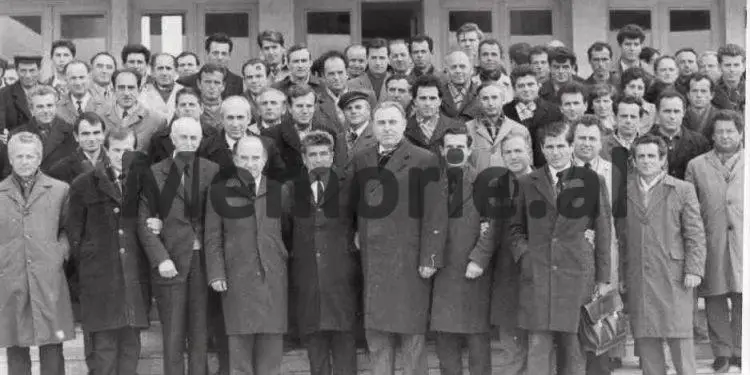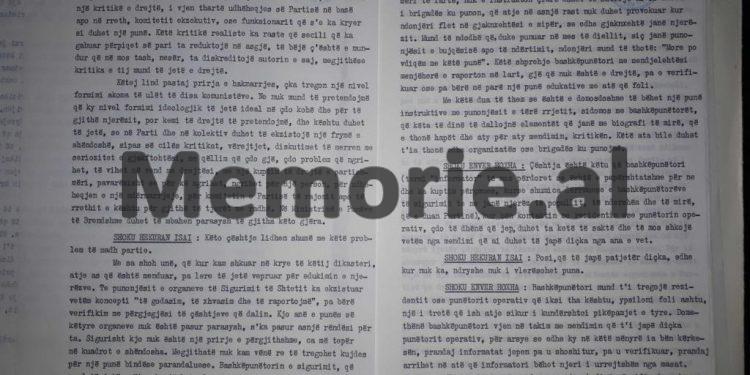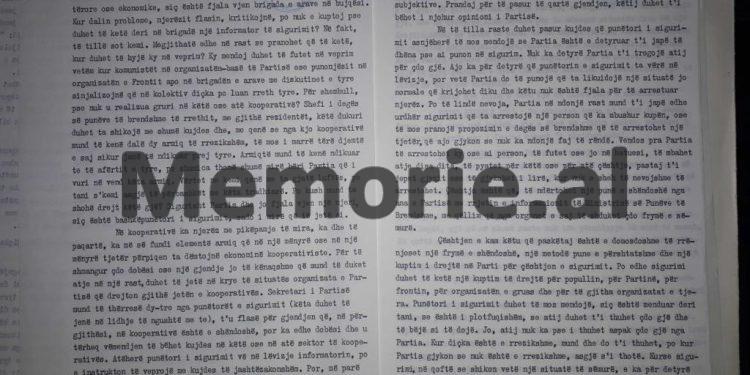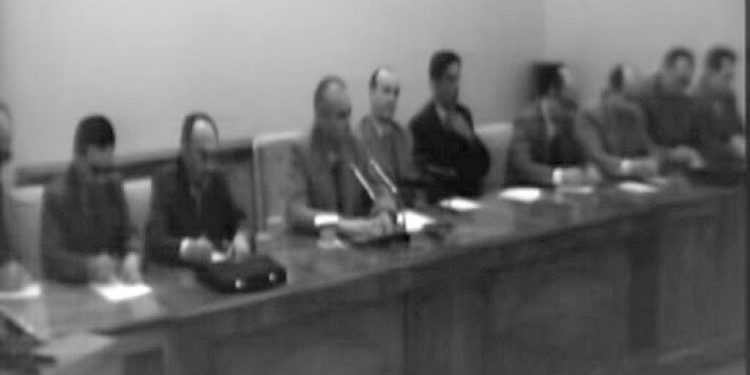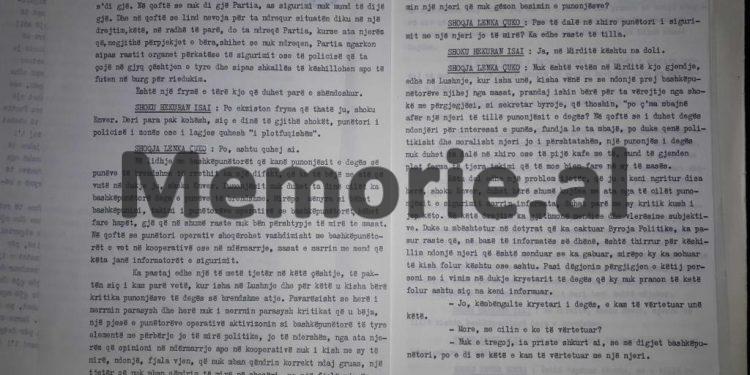Dashnor Kaloçi
The twelfth part
Memorie.al/ publishes some archival documents extracted from the Central State Archive in Tirana (Fund of the former Central Committee of PPSh), which contain the acronym “Secret” and “Top Secret” and belong to a period from January from 1982 until September 1983, where there is a voluminous file with minutes of meetings of the Secretariat of the Central Committee and the Political Bureau of the Central Committee of the PPSh, meetings which were chaired by its General Secretary, Enver Hoxha, where they assisted: Ramiz Alia, Adil Çarçani, Manush Myftiu, Hekuran Isai, Rita Marko, Pali Miska, Hajredin Çeliku, Haki Toska, Simon Stefani, Lenka Çuko, Muho Asllani, Vangjel Çerrava, etc., as the main topic is analysis about the “hostile activity” of Mehmet Shehu and his close collaborators, from Fadil Paçrami, Todi Lubonja, Beqir Balluku, Petrit Dume, Hito Çako, Abdyl Këllezi, Koço Theodhosi, Kiço Ngjela, Vasil Kati, Kadri Hazbiu, Fiqret Shehu, Feçor Shehu, Mihalla q Ziçishti, Llambi Peçini, etc. In the file available to Memorie.al, in addition to the analysis of the “hostile activity of the police agent Mehmet Shehu and his associates Beqir Balluku and Kadri Hazbiu”, in the meetings of the Political Bureau and the daily meetings of the Secretariat of the PPS Central Committee, are analyzed also the activity of the Ministry of Internal Affairs and State Security, with its agency and collaborators, inside and outside the country, the reports and relations of the Albanian state with different countries of the world, such as: the USA, the Soviet Union, West Germany, England, Spain, Italy, as well as those with neighbors, such as Greece and Yugoslavia and the demonstrations in Kosovo, how the world press presented Socialist Albania, the talks with West Germany about the War reparations payments, meetings and conversations with party leaders Marxist-Leninists from different countries of the world, such as Ernst Aust, Zhoao Amazonas, Fosko Dinuçi, etc., regarding the “suicide of Mehmet Shehu”, the problems of Polish immigration Albanian refugees, in different countries of the world, and the change of the exchange rate of the dollar in the remittances, which they made to their relatives in Albania, up to numerous economic problems, from heavy industry, hydropower plants on the cascade of the river Drin, energy import and export, etc., etc.
Continues from last issue
The “Top Secret” document with the minutes of the daily meeting of the secretaries of the Central Committee of the PPSh, held on September 10, 1983, where it was discussed: “On the conclusion of the trial of the remaining enemy elements from Beqir Balluk’s caste and on the necessity of renewing the framework in the Ministry of Internal Affairs and the bodies that depend on it”.
DAILY MEETING OF SECRETARIES OF THE CENTRAL PARTY COMMITTEE ON SEPTEMBER 10, 1983
Top Secret
In this meeting, in which Comrade Hekuran Isai also participated, it was first discussed about the conclusion of the trial of the remaining enemy elements from Beqir Balluku’s caste and the necessity of renewing the staff in the Ministry of Internal Affairs and the bodies that depend on her, for their education with a healthy party spirit, for the need to also carefully interweave old cadres with new ones in other bodies, on the necessity of establishing a party work in the bodies of Internal Affairs and on the care that must be taken to distinguish fair remarks from tendencies with hostile intentions, for the care of a preventive and healing work with people in the spirit of the party, for ensuring the leadership of the Party in the bodies of Internal Affairs, as well as for the structure and powers in the Security bodies.
COMRADE ENVER HOXHA: The security worker should be taught that for this or that person he is tasked with following, to find multiple means to see if what he was told by his network is confirmed in life, or not.
Previously, he did not do this certification, or he did it automatically, he just informed the superior that I heard this about this man and thus called the task accomplished.
It seems to me that the duty of a Security associate cannot be called done, just with a hearing from below. The Security cadre, with its methods and work, I have to look carefully at who it is that follows, how it works, etc. And he must do these things so that it is not understood at all that he is a cadre or collaborator of the State Security.
What I am telling you, that the Security staff should not admit to others that they are Security employees, is not taken into account by everyone. There are some of these who try to appear to be Security workers and with this they want to tell others that; “we have the power”, and it is understood that indirectly, they seek to be respected, to be feared by people, to have authority over them. This is a very dangerous spirit.
Dangerous is the report not properly based on their managers, why in the event that they do not do this well, instead of the love, trust and respect on the right path that the employees should have for the State Security bodies; otherwise it would arouse fear and coldness in them.
When someone makes a statement that raises suspicion, the party must call him first, although the Security Worker can also call him for clarification and advice. When the Security Worker is assigned to do this work, he must start from the permanent order of the Party, to correct what is wrong.
But, before being called, it is necessary to investigate whether, what this person expressed, he did with intention or without intention? However, after a person who has made a mistake is called by the secretary of the party, or by the head of the Department of Internal Affairs, and what he has expressed is pointed out to him, of course he will then be counseled.
However, when I get out of there, I will be thinking: “Who is the one who denounced me for what I said? With whom did I discuss this matter that three or four of us were in coffee and I only once expressed what was said to me”. After thinking carefully, he will be able to identify the person who gave the information about him, in the Party, or in the Department of Internal Affairs, where he was called for advice.
“Such an action is not reasonable”, he will think, because “I am an honest person, a patriot, so I should not be treated like this”. By this, I mean that a lot of care is needed in these actions, the collaborator, as I said, should not let it be understood that he is a Security man. But why does this lack of care happen?
Because in the bodies of Internal Affairs, there is no sound spirit regarding vigilance, issues are not seen in the spirit of the Party, then, differentiations are not made. Of course, the Security Worker cannot turn a blind eye to the information that a person gives him, only that, before making a case, the information he receives, he must process it well in his mind, then act, not go at once to the superior and to report that this one said this, the other said that, and on this basis to make a list of slogans and those who develop “agitation and propaganda”. This is very dangerous.
One should not act in this way, without distinguishing between objective criticism and hostile activity. But who can make this distinction? This can be done by those who clearly understand the Party’s line, why in a conversation, in a discussion between people, criticism is also made, about the work for the people, otherwise their mouths will be closed, criticism will not be made, because of shyness, criticism it can go wrong in the Party, or in the Security organs and be interpreted badly.
Then the other will say: “if that’s the case, it’s better not to talk.” We must think deeply, act tactfully and carefully, so that our healthy people do not say: “What do I need”, “why should I speak”? etc.
Such an expression is often heard in the masses and this gives rise to indifference, which is reflected in the expressions I said, which are a reflex of a sick work, according to which, if in a discussion, one says, for example: “Mo, what is this minister, why are they keeping this man here, this is a porridge”, not to be reported immediately and easily, as a hostile activity.
COMRADE HEKURAN ISAI: Sir, and since the ministers are the nomenclature of the Politburo, the Security Worker inserts this expression, as if its decision was taken lightly, reasoning that the Politburo thought carefully about this man before appointing him.
COMRADE ENVER HOXHA: So, when a person criticizes a minister as a person, it is taken as if he has criticized the whole line, since the minister is a personality that has been decided by the Political Bureau. Reasoning and acting like this, then the question arises that the other, even when faced with flagrant, unfair actions, says: “why should I speak, why should I criticize you?!
Come on, even if I criticize once or twice, not only does no one listen to me, but then the party secretary calls me and gives me the epithet, critic, quarrelsome talker”.
Are there talkers and brawlers in society? Yes, there are some, but most of them are fair, active and vigilant people who do not shut up when they notice unfair views and actions.
However, the tendency of those who criticize that they have made mistakes is that they misinterpret the fair remarks directed at them, to discredit those who criticize with facts, that the criticism spoils their work, spoils their peace.
This is a big social and Party problem that will be well taken into account. If we do not fight this unhealthy spirit in the Party and not only with the Security Workers, but also in the Party, it will harm us a lot.
COMRADE RAMIZ ALIA: Even among some party workers, there is such a foreign tendency.
COMRADE ENVER HOXHA: It also happens in the party. We all know the principles and sometimes repeat them, but what is the truth, when a fair criticism is made, it sours the leadership of the Party at the base, or in the circle, the Executive Committee, or the functionary who has not performed as need a job
This realistic criticism that there are times that everyone who has made a mistake, first tries to reduce it to nothing, to do what is possible, so that if not now, tomorrow it will discredit its author, although his criticism may be right. This is where the tendency to take revenge arises, which shows a very low level of education of some communists.
We cannot claim that this level of ideological formation is ideal at all times and for all people, but we have the right to claim and this is how it should be, that in the party and in the collective, there should be a healthy spirit, according to which, criticisms, remarks, discussions should be taken with seriousness and coolness, in order that everything, every problem that arises, is put in place with justice, and with a fair understanding and partisanship, regardless of for whom it is raised, is raised for a person, for the leadership of an enterprise, for the Party Committee of the region or district, and so on for all others in turn. In the Ministry of Internal Affairs, all these things must be taken into account.
COMRADE HEKURAN ISAI: These issues are much related to this big party problem. As far as I can see, since I have been in charge of this department, there has not even been a thought, let alone an action, for the education of the people.
Among the employees of the State Security bodies, there was only the concept of “hitting, extorting and reporting”, without responsible verification of the issues that arise. This aspect of the work of these bodies was not taken into account; it was not of any importance to them.
Of course, this is not a general trend, rather in healthy frames. The Security Collaborator, who may belong to an agricultural brigade, the Operative Worker who keeps him in touch, does not feed him with a healthy spirit, with high partisanship, does not instruct him what he should do as a member of the brigade where he works, that there under no circumstances should be provoked when someone speaks in hot-bloodedness, because people are also hot-blooded.
It may happen that working in the middle of the sun, such as agricultural or construction workers, someone may say: “More, we died in this work”. This expression, the co-worker quickly reports up, which is not fair, without verifying it, or without first doing some educational work with the one who spoke.
By this I mean, that it is necessary to do an instructive work, with all network employees, especially with the collaborators, so that they know how to distinguish the elements that have a good biography, that say the thought step by step, criticism. Even these ones should tell the brigade and the collective where they work.
COMRADE ENVER HOXHA: The issue here is that the collaborator (the term “informant” is no longer used, because it is inappropriate for us and has a derogatory meaning, while the vast majority of the collaborators of the Security, in our country, are people of the people, honest and good , who love the Party), when making contact with the resident or the Operative Worker, every data he gives must be correct and not just based on the thought that he must give something from his side.
COMRADE HEKURAN ISAI: The husband must give something, even when he doesn’t have it; otherwise his work is not appreciated.
COMRADE ENVER HOXHA: The colleague can tell the resident or the Operative Worker, that the ixi said so, the epsilon spoke like that, a third who was there, as if he opposes their views. In other words, the collaborator comes to the meeting with the idea of giving something to the Operative Worker, because he also makes the request in this way, therefore the information is given without being sifted, without being verified, that is why the informant becomes a person hated by the masses.
In most cases, people do not know that there is a Security agent among them, especially in the countryside. People know that there is a Party, there is a Front organization, and there is also a state or economic organization based on it, such as the field brigade in agriculture. When problems arise, people talk, criticize, but I don’t understand why it should be up to the brigade, a Security informant? In fact, we have such today.
However, even if it is accepted that there is, when should this come into action? I think this should be put into action, only when the communists in the basic organization of the Party, or the employees of the Front organization, or in the field brigade, with their discussions, signal that in the collective, something is being played around them. For example, why was the wheat not realized in this or that cooperative?
The head of the Department of Internal Affairs of the district, together with all the residents, should watch this phenomenon very carefully, and since two dangerous enemies have emerged from this cooperative, not to take all its sons, as if they were influenced from them. Enemies may have influenced their relatives, but most say that the Party did very well to put these enemies in place.
Indeed, we were with them during the War, but we have nothing in common with these traitors. But who can see this right? Yes, of course, the Party and not a person like the Security collaborator, no matter how good he is.
In cooperatives there are people with good views, there are unclear ones, and finally there are enemy elements, who in one way or another, try to damage the cooperative economy.
In order to avoid any weakness, or an unsatisfactory condition that may appear there in one case, there must be there at the head of the situation, the Party organization which must direct the whole life of the cooperative.
The Party Secretary can call two or three Security Workers (they must be in close contact with him), talk to them about the situation that, in general, in the cooperative is sound, but there are also weaknesses and draw their attention , be careful in this or that sector of the cooperative.
Then, the Security Worker sets the associate in motion, and the instructor to act with extreme care. But before he acts, the associate must be well explained what is going on there.
This cannot be well known by one who may have subjective views. Therefore, in order to have a clear situation, the opinion of the Party should be made known to him.
In such cases, care must be taken that the Security Worker does not immediately think that the Party is obliged to provide information, why he works in Security. The Party has no duty to tell him about everything.
It has the duty to set the Security Worker in motion, but the Party itself will work to liquidate an abnormal situation that is created somewhere, and this is not about arming people. Memorie.al
The next issue follows




